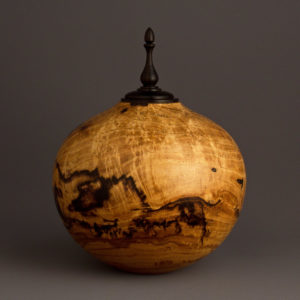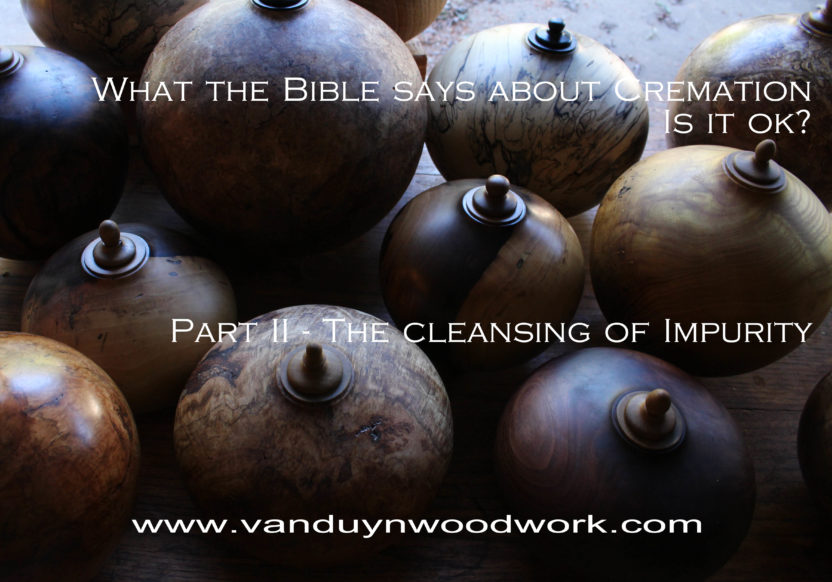
Are you considering cremation, let’s take a look at what the bible says about cremation. I am a wood sculptor out of Raleigh, North Carolina doing work in urn artistry. I have been turning custom cremation vessels for the many years now. My first article delved into the Bible’s take on the keeping of ashes. This article looks more in depth on the concept of cleansing of impurity and its connection with cremation. I thought it time to nail down (no pun intended) what the bible says about cremation.
In all seriousness, if you are now educating yourself on the logistics of cremation, I am glad that you made it to this page, I hope it helps. Also, feel free to take a look at my urn information page after you have read this article, it may be some help to you. I also invite you to take a look at my cremation vessels found on my cremation urn artistry page.
I personally do not hold a divinity degree or make my profession in ministry. To that point I want to look at what the bible says, giving it the authority rather than myself. So I am going to cite and show you the verses from scripture. Most of the articles that I have dug through tend to rely on what a person says, giving few examples of scripture. I want you to feel comfortable that it is coming from the Bible and you can check up on what I have to say for yourself.
I examined all the verses that I could find that dealt specifically with burning, ashes, and dust, some more relevant to cremation than others. So… what does the bible say about cremation? In general, I find there are no explicit verses in the bible that promote or denounce the act of cremation. Therefor much of what the bible says requires a bit of delving deeper into since the verses aren’t that definitive.
Is burning used for the cleansing of impurity?
Looking at several verses I see how someone could draw the conclusion that burning in the bible is for cleansing the impurity. So, is it a good idea to cremate if burning was reserved for the impure? Lets take a look a what the bible says about cremation in reference to this question. I am including the verses in the article as I believe it will be easier to reference scripture. Click the links to open in another tab to examine for context.
Joshua 7:25 – 25 Joshua said, “Why have you brought this trouble on us? The Lord will bring trouble on you today.” Then all Israel stoned him, and after they had stoned the rest, they burned them.
After the fall of Jericho, Achan (that’s who Joshua is talking to) took some plunder which was considered devoted. God in the previous chapter declared that all the plunder, livestock, etc., from Jericho, was to be burned. Deuteronomy 13:12-18 paints a very similar picture to that of Jericho and Achan.
I believe the burning has more to do with the plunder as Achan’s fate was already foretold. Additionally, Achan may have only been stoned, as Deuteronomy 13:16 suggests that the town and plunder are to be burned. God declares, the sword for the inhabitants and livestock.
Genesis 38:24 – 24 About three months later Judah was told, “Your daughter-in-law Tamar is guilty of prostitution, and as a result she is now pregnant.” Judah said, “Bring her out and have her burned to death!”
Judah’s outrage likely follows what is prescribed in Deuteronomy 22:20-24. Leviticus 21:9 (see below) I think accounts for the burning rather than the stoning prescribed in Deuteronomy.
Leviticus 20:14 – 14 “‘If a man marries both a woman and her mother, it is wicked. Both he and they must be burned in the fire, so that no wickedness will be among you.
Leviticus 21:9 – 9 “‘If a priest’s daughter defiles herself by becoming a prostitute, she disgraces her father; she must be burned in the fire.
These two passages prescribe the cleansing of wickedness that should take place. To my knowledge the only instance where the bible describes one of these situations is with Judah and Tamar in Gen. 38. In this case Judah was actually the reason for Tamar’s prostitution, and neither were actually burned. In Judah’s words… ““She is more righteous than I, since I wouldn’t give her to my son Shelah.” And he did not sleep with her again.” So here we have an instance of burning for cleansing that was not carried out, and nothing that suggests cremation of the dead is actually a bad thing.
Leviticus 10:1-2 – Aaron’s sons Nadab and Abihu took their censers, put fire in them and added incense; and they offered unauthorized fire before the Lord, contrary to his command. 2 So fire came out from the presence of the Lord and consumed them, and they died before the Lord.
Numbers 11:1 – Now the people complained about their hardships in the hearing of the Lord, and when he heard them his anger was aroused. Then fire from the Lord burned among them and consumed some of the outskirts of the camp.
“Consumed” is the interesting word in these last two passages. I see the argument that the people were not burned down to ash. Leviticus 10:4 talks about moving the bodies, clothes, etc. so they could not have been burned up completely. I suspect its something similar in numbers 11.
2 Kings 17:31 – 31 the Avvites made Nibhaz and Tartak, and the Sepharvites burned their children in the fire as sacrifices to Adrammelekand Anammelek, the gods of Sepharvaim.
Jerimiah 19:5 – 5 They have built the high places of Baal to burn their children in the fire as offerings to Baal—something I did not command or mention, nor did it enter my mind.
There are several instances in the old testament of child sacrifices (burning) to the pagan gods of the region. God makes it very clear where he stands in Jerimiah 19. These are the some of the instances where fire or burning is concerned. Those verses find themselves in this category due to some connection with removing wickedness or disobedience from the community.
Take all these verses together it looks to me that crux of the matter centers around obedience, wickedness, grumbling, and idolatry. God wants his people set apart from those things, and calls us away from them. So yes, there is some element of burning used for the cleansing of the impure. But does that have anything to do with cremation?
What the Bible says about cremation… thumbs up or down?
Take the verses above and I personally find difficulty in concluding that cremation of the dead is a bad thing. Despite that, there are some that think those things are connected. From what I understand, the line of though is God had intended for his people to be a nation of priests (Exodus 19:6). Then couple that with the levitical standards for priests (Leviticus 21). As far as cremation goes most of the problems in being made unclean revolve around the touching of dead bodies.
This would be a problem if you were actually doing the cremation and touching the dead body, which the vast majority of people are not. It also presumes that the cremains are equal to a dead body, the bible does not explicitly define this. So no good answers there, could go either way on that. This also invites fun questions like, if I wore gloves would I actually be touching a dead body? This line of thought seems fraught with pitfalls, namely legalism and taking the rest of the bible out of context.
Cremation is the Burning of the Dead not the living
One thing that comes to mind is that, outside of the child sacrifices, each of the people mentioned above were not burned down to ash completely. I separate the child sacrifices as, one its inconclusive as to the condition of the children’s remains. Secondly, those where the actions of men and not of God, and have more to do with murder than treatment of the dead.
Achan, Aaron’s Sons, and the people complaining of their hardships have language that deal with consumption rather than incineration. Tamar and Judah were not even punished by death for their actions either. So to that point, each of these verses deals with someone that is living, and what punishment was for said actions.
Thus it strikes me as rather round of bout to suggest that cremation of the dead has a link to punishment of the wicked, disobedient, and unfaithful. Ultimately we are talking about what happens to a persons final remains, their physical body. Mathew 10:28 comes to mind as we should be concerned with what destroys the body as well as the soul. This strikes me as important as I wager God is more concerned with where our hearts are and how that prompts our actions rather than what happens to our physical bodies once we have left them.
Final thoughts on the Bible’s take of cremation…
 Considering the bible as a whole, I believe that what is in someone’s heart is more important to God. We are called to be in relationship with people and concerned about the injustice and oppression of this world (Isiah 58:5-11). Always striving to be clean is in reality not something that is possible and creates unintended problems. See my article on what does the bible say about keeping ashes. Additionally if you have questions about whether God can resurrect our bodies if they are cremated then delve a bit deeper into what our ultimate destination is.
Considering the bible as a whole, I believe that what is in someone’s heart is more important to God. We are called to be in relationship with people and concerned about the injustice and oppression of this world (Isiah 58:5-11). Always striving to be clean is in reality not something that is possible and creates unintended problems. See my article on what does the bible say about keeping ashes. Additionally if you have questions about whether God can resurrect our bodies if they are cremated then delve a bit deeper into what our ultimate destination is.
The argument of burning being reserved for the judgment of the impure is flawed as well. Ultimately the reality of things is that we are all unclean and impure, whether we want to admit it or not. We probably deserve judgement for the lives we live, but that’s why Jesus Christ came. Consider John’s writing (1 John 3:3-6) 3 All who have this hope in him purify themselves, just as he is pure. 4 Everyone who sins breaks the law; in fact, sin is lawlessness. 5 But you know that he appeared so that he might take away our sins. And in him is no sin. 6 No one who lives in him keeps on sinning.

